
Table of Contents
What Is Nutrition Deficiency?
Nutrition deficiency occurs when the body lacks essential nutrients, leading to various health issues such as tiredness, weakness, and poor appetite. Studies show that nutrition deficiency can significantly impact overall health, affecting energy levels, immune function, and even mental well-being. It is crucial to understand the causes, symptoms, and solutions to ensure optimal health and well-being.
A poor diet, certain medical conditions, and lifestyle factors like smoking or excessive alcohol consumption can increase the risk of nutrition deficiency. Recognising the signs early and making dietary changes can help prevent long-term health complications.
A well-balanced diet rich in fruits, vegetables, whole grains, and lean proteins is essential for maintaining optimal health. Many people do not realise they have a nutrition deficiency until they begin to experience severe symptoms.
Why Nutrition Deficiency Matters
Every organ and system in your body relies on a steady supply of vitamins and minerals. Without them, your body struggles to repair itself, fight off infections, and maintain stable energy levels. Long-term nutrition deficiency can lead to serious health problems such as osteoporosis, heart disease, cognitive decline, and weakened immunity.
Modern diets, often high in processed foods, lack essential nutrients, making nutrition deficiency more common than ever. Understanding the root causes and taking preventive measures through diet and supplementation can significantly improve health and well-being.
By recognising the early symptoms and knowing which foods to eat, you can combat nutrition deficiency and maintain a healthier lifestyle.
Common Nutrition Deficiencies and How to Fix Them
1. Iron Deficiency – The Energy Killer
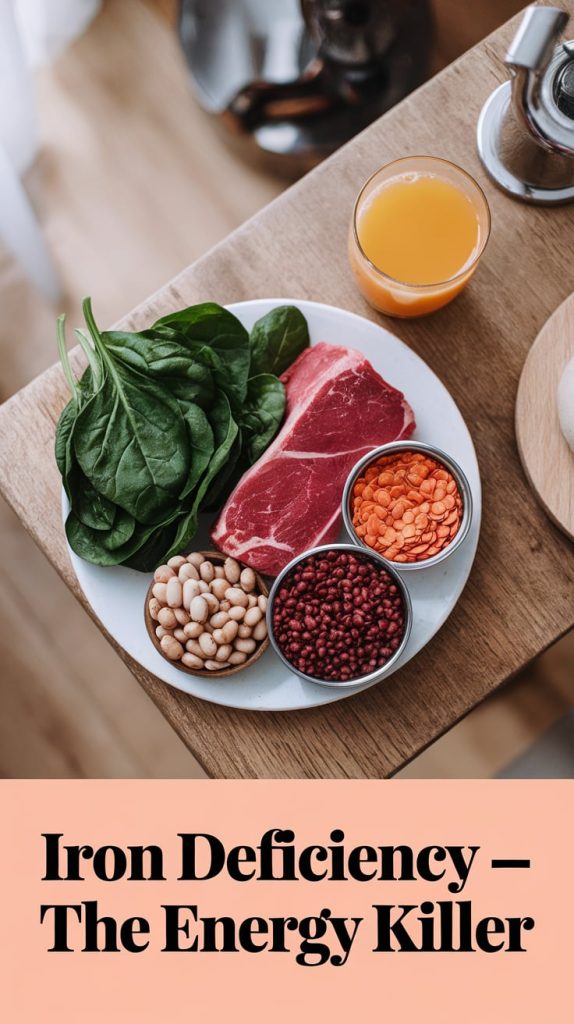
If you have pale skin, fatigue, frequent dizziness, or shortness of breath, you may have iron deficiency.
Why It Matters: Iron is crucial for red blood cell production, which carries oxygen throughout the body. Without enough iron, the body can’t function optimally, leading to anaemia, fatigue, and difficulty concentrating. Severe iron deficiency can also cause brittle nails, cold hands and feet, and frequent headaches.
Fix It: Consume iron-rich foods such as spinach, lentils, red meat, and fortified cereals. Pairing these with vitamin C-rich foods like oranges and bell peppers enhances absorption.
Additional Tips: Avoid drinking tea or coffee with meals, as they can inhibit iron absorption. Severe deficiencies may require iron supplements. Pregnant women, vegetarians, and individuals with heavy menstrual cycles should monitor their iron intake closely.
2. Vitamin D Deficiency – The Silent Health Risk
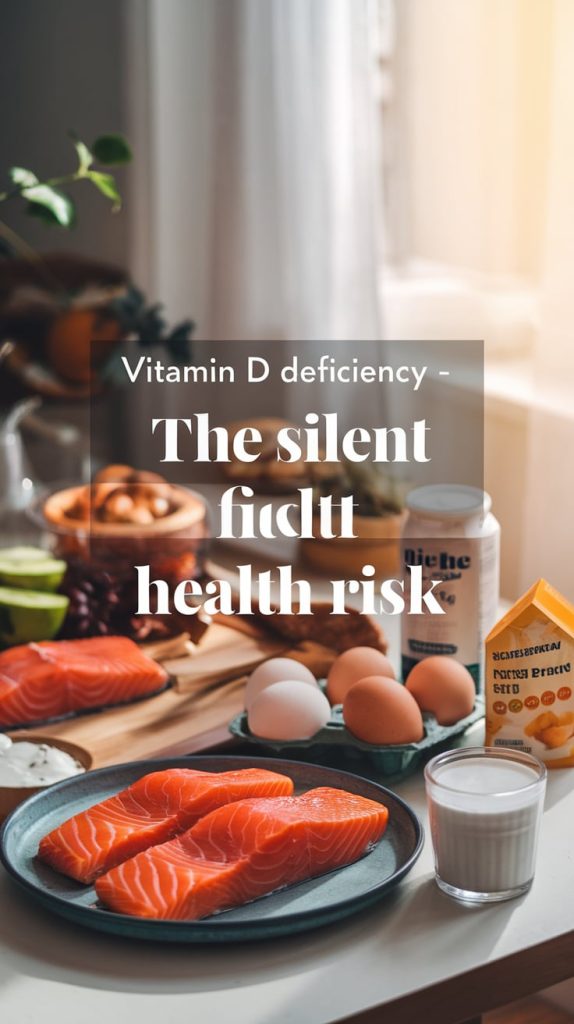
If you experience frequent colds, depression, bone pain, or muscle weakness, you may have vitamin D deficiency.
Why It Matters: Vitamin D is vital for calcium absorption, bone health, and immune function. Low levels can lead to weak bones, increased susceptibility to infections, and fatigue. Studies show that people who spend most of their time indoors or live in colder climates are more likely to suffer from vitamin D deficiency.
Fix It: Spend at least 15–30 minutes in the sun daily. Eat vitamin D-rich foods like fatty fish (salmon, mackerel), egg yolks, and fortified dairy products.
Additional Tips: Since vitamin D levels drop in winter due to reduced sunlight exposure, consider taking a supplement during colder months. People with darker skin tones also have a higher risk of deficiency due to lower natural vitamin D synthesis.
3. Vitamin B12 Deficiency – The Brain Booster
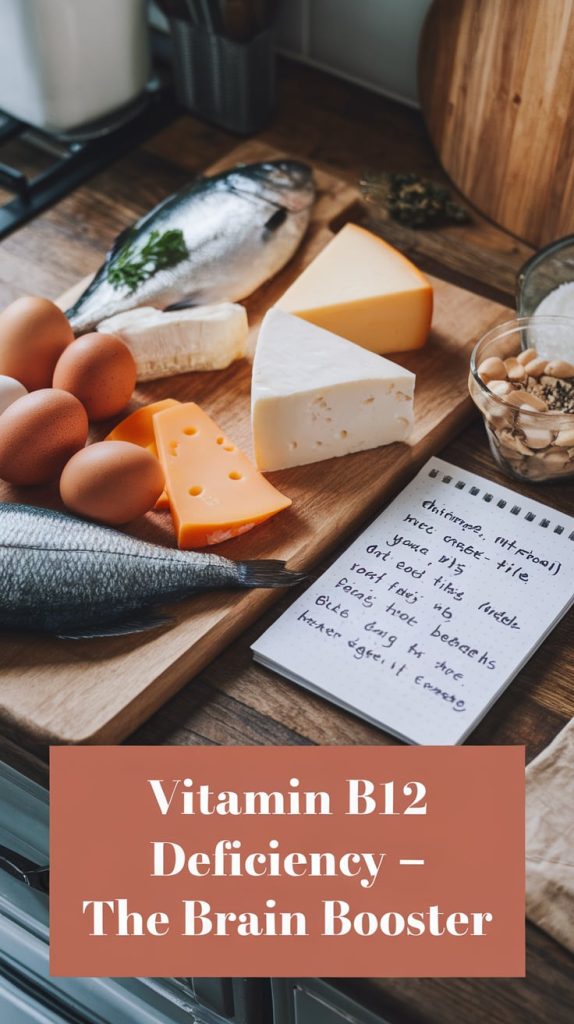
If you have memory issues, tingling hands and feet, or fatigue, you may have vitamin B12 deficiency.
Why It Matters: B12 is essential for nerve function, red blood cell production, and brain health. A deficiency can lead to anaemia, nerve damage, and cognitive issues. B12 is primarily found in animal-based foods, making vegetarians and vegans particularly susceptible to deficiency.
Fix It: Eat animal-based foods such as fish, eggs, and dairy. Vegetarians and vegans may need fortified foods or B12 supplements.
Additional Tips: Long-term deficiency can cause irreversible nerve damage, so checking B12 levels through a blood test is crucial. Older adults may also struggle with B12 absorption and should monitor their intake closely.
4. Magnesium Deficiency – The Overlooked Mineral
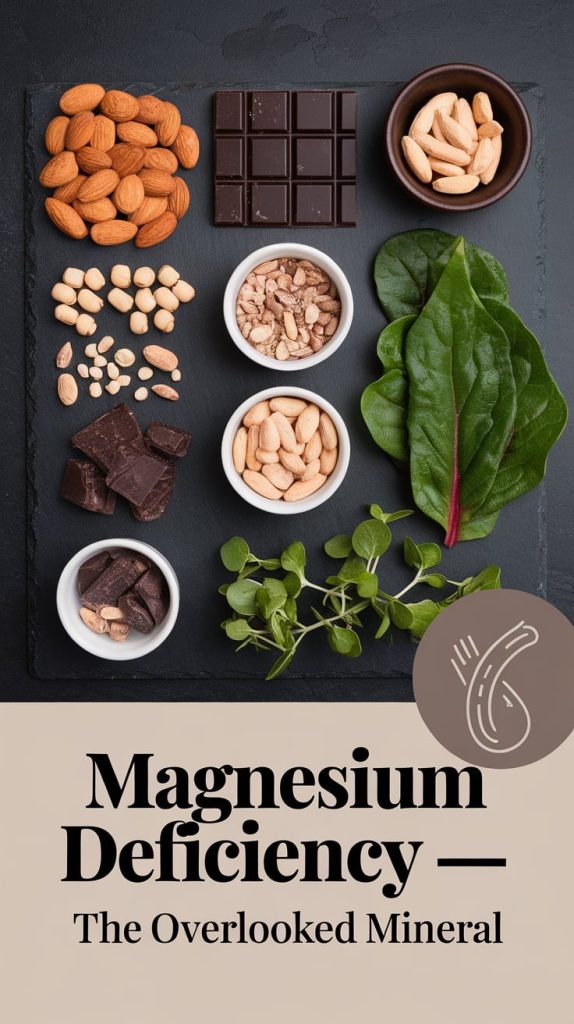
If you experience muscle cramps, high stress levels, difficulty sleeping, or anxiety, you may have magnesium deficiency.
Why It Matters: Magnesium supports muscle function, nerve relaxation, and overall cardiovascular health. Deficiency can lead to muscle spasms, irregular heartbeat, and insomnia. Magnesium is involved in over 300 biochemical reactions in the body, making it one of the most important minerals.
Fix It: Eat magnesium-rich foods such as nuts, seeds, whole grains, leafy greens, and dark chocolate.
Additional Tips: Try soaking in an Epsom salt bath, as magnesium can be absorbed through the skin. People with digestive disorders like Crohn’s disease may have trouble absorbing magnesium.
5. Calcium Deficiency – The Bone Protector
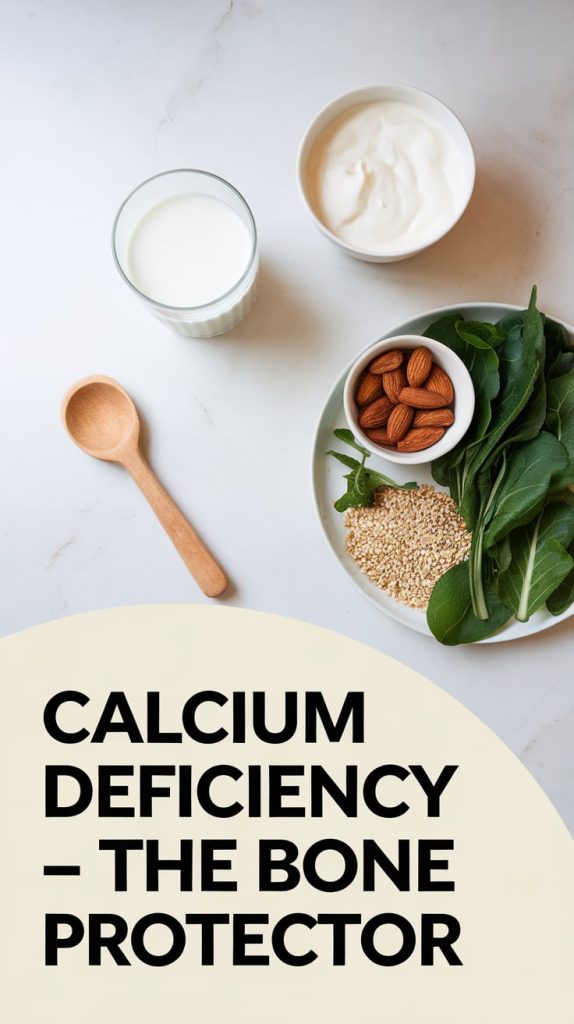
If you have brittle nails, muscle spasms, frequent fractures, or weak bones, you may have calcium deficiency.
Why It Matters: Calcium is essential for strong bones, teeth, and muscle function. A prolonged deficiency can lead to osteoporosis and fractures. Calcium also plays a role in heart function and nerve signalling.
Fix It: Include dairy products, leafy greens, almonds, and fortified plant-based milk in your diet.
Additional Tips: Calcium is best absorbed with vitamin D, so ensure you are getting enough of both nutrients. People who are lactose intolerant or follow a vegan diet should consider calcium supplements.
6. Zinc Deficiency – The Immunity Shield
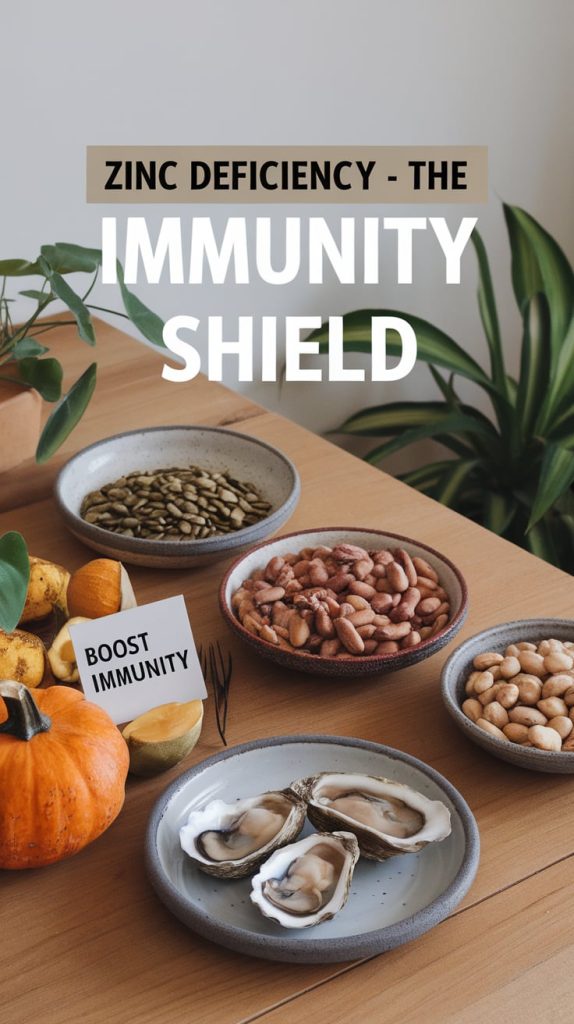
If you experience frequent infections, slow wound healing, hair loss, or loss of taste and smell, you may have zinc deficiency.
Why It Matters: Zinc is vital for immune function, wound healing, and cell repair. A deficiency can lead to recurrent colds, poor healing, and weakened immune response. Zinc is especially important for children, pregnant women, and older adults.
Fix It: Eat zinc-rich foods like pumpkin seeds, chickpeas, cashews, eggs, and red meat.
Additional Tips: Avoid excessive alcohol and processed food consumption, as they can deplete zinc levels.
7. Omega-3 Deficiency – The Heart and Brain Protector
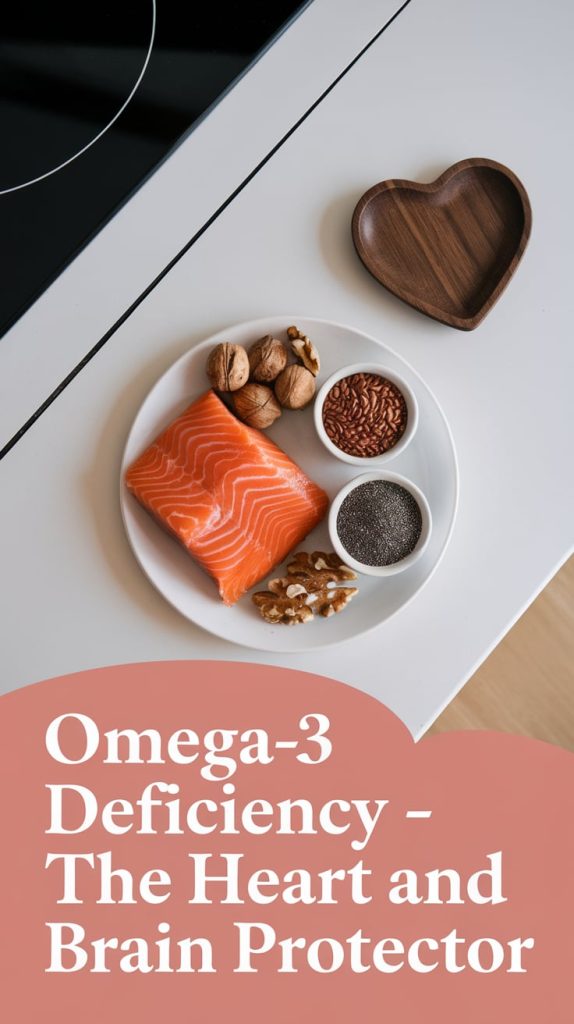
If you have dry skin, joint pain, difficulty concentrating, or mood swings, you may have omega-3 deficiency.
Why It Matters: Omega-3 fatty acids play a crucial role in heart health, brain function, and reducing inflammation. A lack of omega-3s can contribute to depression, ADHD, and cognitive decline.
Fix It: Consume fatty fish (salmon, sardines), flaxseeds, walnuts, and chia seeds. If you don’t eat fish, consider an algae-based omega-3 supplement.
Additional Tips: Balance omega-3 intake with omega-6 to maintain an optimal ratio and avoid excessive inflammation.
Final Thoughts
Recognising and addressing nutrition deficiency is essential for maintaining good health. A well-balanced diet filled with nutrient-dense foods such as fruits, vegetables, whole grains, and lean proteins can prevent many common deficiencies.
If you suspect a deficiency, consult a healthcare professional for proper testing and recommendations. Being proactive about your nutritional health can help you feel more energetic, improve your immune system, and enhance overall well-being.
Take charge of your health today! Start making small, manageable changes to your diet and ensure your body gets the essential nutrients it needs. Which nutrition deficiency do you think you might need to address? Share your thoughts in the comments below!
Frequently Asked Questions (FAQ)
1. What are the most common signs of nutrition deficiency? Fatigue, weakness, brittle nails, hair loss, frequent infections, muscle cramps, and poor concentration are some of the most common signs.
2. How can I prevent nutrition deficiencies? Eating a balanced diet rich in fruits, vegetables, whole grains, lean proteins, and healthy fats can help prevent deficiencies. Supplements may be necessary for those at higher risk.
3. Can nutrition deficiencies lead to serious health problems? Yes. Long-term deficiencies can cause conditions such as osteoporosis, anaemia, weakened immunity, and cognitive decline.
4. Who is most at risk of developing a nutrition deficiency? Pregnant women, older adults, vegetarians, vegans, and people with certain medical conditions affecting nutrient absorption are at higher risk.
5. How can I test for a nutrition deficiency? A blood test ordered by a healthcare provider can determine if you have a deficiency in key vitamins and minerals.
6. Are supplements necessary to fix a deficiency? While diet should always be the first approach, supplements can be beneficial for those who struggle to meet their nutritional needs through food alone.
7. Can stress contribute to nutrition deficiencies? Yes. Chronic stress can deplete key nutrients like magnesium and vitamin C, leading to further deficiencies if not managed properly.
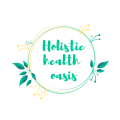
I believe this web site has some very excellent information for everyone : D.
I too think thus, perfectly written post! .
thank you 🙂
I am impressed with this internet site, real I am a fan.
Hi there! This post couldn’t be written any better! Reading through this post reminds me of my previous room mate! He always kept talking about this. I will forward this article to him. Pretty sure he will have a good read. Thank you for sharing!